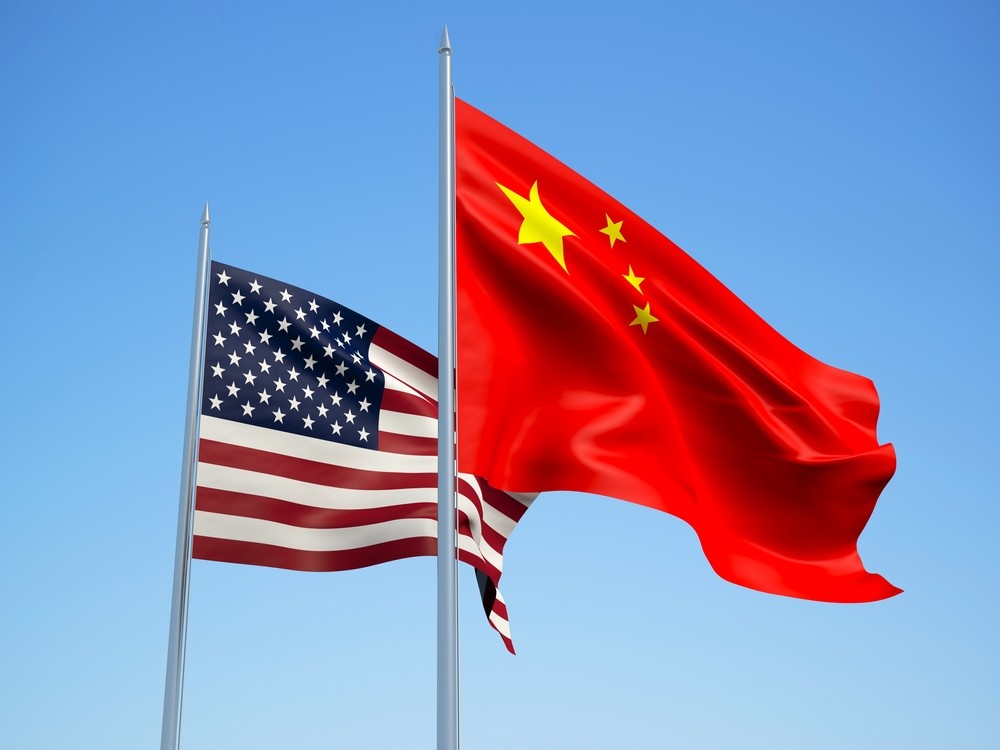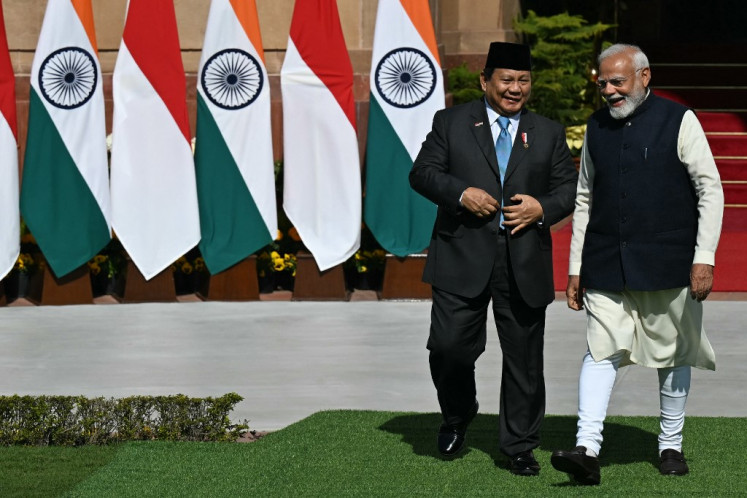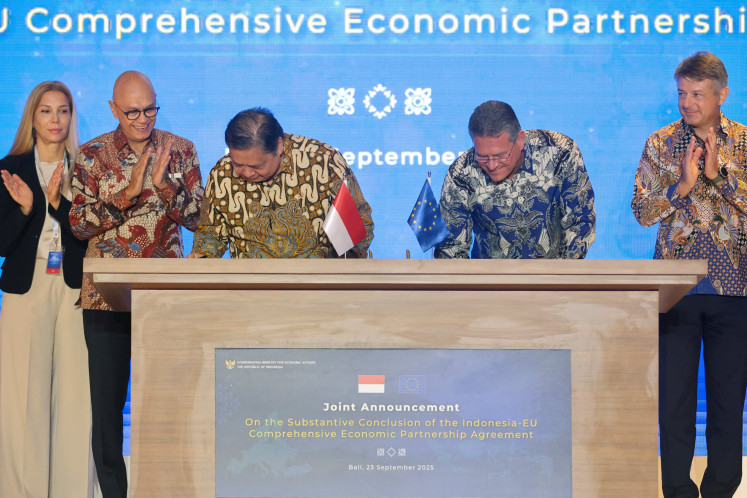Popular Reads
Top Results
Can't find what you're looking for?
View all search resultsPopular Reads
Top Results
Can't find what you're looking for?
View all search resultsWhy China can't win the trade war
Change text size
Gift Premium Articles
to Anyone
O
ne of the biggest dilemmas of liberalism, ever since David Hume and Adam Smith, was an insight into reality; whether the world is essentially Hobbesian or Kantian.
As postulated, the main task of any liberal state is to enable and maintain wealth of its nation, which of course rests upon wealthy individuals inhabiting the particular state.
That imperative brought about another dilemma: if wealthy individual, the state will rob you, but in absence of it, the pauperized masses will mob you. The invisible hand of Smith’s followers have found the satisfactory answer — sovereign debt.
That “invention“ meant: relatively strong central government of the state. Instead of popular control through the democratic checks-and-balances mechanism, such a state should be rather heavily indebted.
Debt — firstly to local merchants, than to foreigners — is a far more powerful deterrent, as it resides outside the popular check domain. With such a mixed blessing, no empire can easily demonetize its legitimacy, and abandon its hierarchical but invisible and unconstitutional controls. This is how a debtor empire was born. A blessing or totalitarian curse? Let us briefly examine it.
The Soviet Union — much as (the pre-Deng Xiaoping’s) China itself — was far more of a classic continental military empire (overtly brutal; rigid, authoritative, anti-individual, apparent, secretive), while the United States was more a financial-trading empire (covertly coercive; hierarchical, yet asocial, exploitative, pervasive, polarizing).
On opposite sides of the globe and cognition, to each other they remained enigmatic, mysterious and incalculable: Bear of permafrost vs. Fish of the warm seas. Sparta vs. Athens. Rome vs. Phoenicia. However, common for the both was a super-appetite for omnipresence. Along with the price to pay for it.
Consequently, the Soviets went bankrupt by mid 1980s — they cracked under its own weight, imperially overstretched. So did the Americans — the “white man burden“ — fractured them already by the Vietnam war, with the Nixon shock only officializing it. However, the US imperium managed to survive and to outlive the Soviets.
How? The US, with its financial capital (or an outfoxing illusion of it), evolved into a debtor empire through the Wall Street guarantees.
Titanium-made Sputnik vs. gold mine of printed-paper. Nothing epitomizes this better than the words of the longest serving US Federal Reserve’s boss, Alan Greenspan, who famously said to then-French president Jacques Chirac: “True, the dollar is our currency, but your problem”. Hegemony vs. hegemoney.
Conventional economic theory teaches us that money is a universal equivalent to all goods. Historically, currencies were a space and time-related, to say locality dependent. However, like no currency ever before, the US dollar became — past the World War II — the universal equivalent to all other moneys of the world. According to history of currencies, the core component of the non-precious metals money is a so-called promissory note — intangible belief that, by any given point of future, a particular shiny paper (self-styled as money) will be smoothly exchanged for real goods.
Thus, roughly speaking, money is nothing else but a civilizational construct about imagined or projected tomorrow — that the next day (which nobody has ever seen in the history of humankind, but everybody operates with) definitely comes, and that this tomorrow will certainly be a better day then our yesterday or even our today.
This and similar types of social contracts (horizontal and vertical) over the collective constructs hold society together as much as its economy keeps it alive and evolving. Hence, it is money that powers economy, but our blind faith in (constructed) tomorrows and its alleged certainty is what empowers money.
After the collapse of the Soviet Union, Americans accelerated expansion while waiting for (real or imagined) adversaries to further decline, “liberalize” and bandwagon behind the US. Expansion is the path to security dictatum only exacerbated the problems afflicting the Pax Americana. That is how the capability of the US to maintain its order started to erode faster than the capacity of its opponents to challenge it. A classical imperial self-entrapment!
And the repeated failure to notice and recalibrate its imperial retreat brought the painful hangovers to Washington by the last presidential elections. Inability to manage the rising costs of sustaining the imperial order only increased the domestic popular revolt and political pressure to abandon its “mission” altogether. Perfectly hitting the target to miss everything else.
When the Soviets lost their own indigenous ideological matrix and maverick confrontational stance, and when the US-dominated West missed to triumph although winning the Cold War, how to expect from the imitator to score the lasting moral or even a momentary economic victory?
Neither more confrontation and more carbons nor more weaponized trade and traded weapons will save our day. It failed in past, it will fail again any given day.
Interestingly, China opposed the I World, left the II in rift, and ever since Bandung of 1955 it neither won nor joined the III Way. Today, many see it as a main contestant. But, where is a lasting success?
Greening international relations along with greening of economy (geopolitical and environmental understanding, deacidification and relaxation) is the only way out. Historically, no global leader has ever emerged from a shaky and distrustful neighborhood, or by offering little bit more of the same in lieu of an innovative technological advancement. Ergo, it all starts from within, from at home. Without support from a home base, there is no game changer. China’s home is Asia.
Hence, it is not only a new, non-imitative, turn of technology what is needed. Without truly and sincerely embracing mechanisms such as the Non-Aligned Movement, ASEAN and South Asian Association for Regional Cooperation and the main champions of multilateralism in Asia, those being India Indonesia and Japan first of all, China has no future of what is planetary awaited — the third force, a game-changer, lasting and trusted global leader.
***
The author is chairperson and professor in international law and global political studies, Vienna, Austria. His seventh book, From WW I to www – Europe and the World 1918-2018, has just been published.











